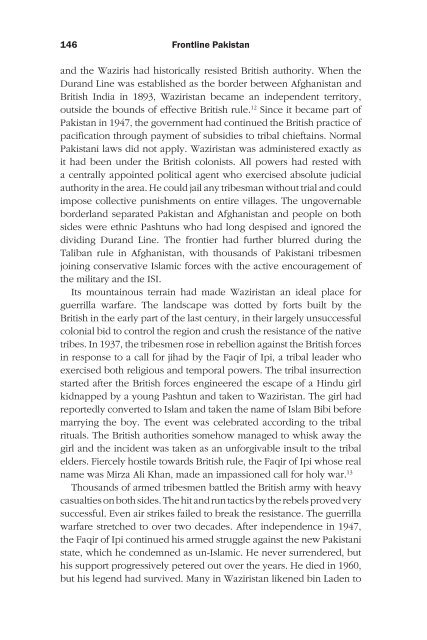Frontline Pakistan : The Struggle With Militant Islam - Arz-e-Pak
Frontline Pakistan : The Struggle With Militant Islam - Arz-e-Pak
Frontline Pakistan : The Struggle With Militant Islam - Arz-e-Pak
You also want an ePaper? Increase the reach of your titles
YUMPU automatically turns print PDFs into web optimized ePapers that Google loves.
1 <strong>Frontline</strong> <strong><strong>Pak</strong>istan</strong><br />
and the Waziris had historically resisted British authority. When the<br />
Durand Line was established as the border between Afghanistan and<br />
British India in 1893, Waziristan became an independent territory,<br />
outside the bounds of effective British rule. 12 Since it became part of<br />
<strong><strong>Pak</strong>istan</strong> in 1947, the government had continued the British practice of<br />
pacification through payment of subsidies to tribal chieftains. Normal<br />
<strong><strong>Pak</strong>istan</strong>i laws did not apply. Waziristan was administered exactly as<br />
it had been under the British colonists. All powers had rested with<br />
a centrally appointed political agent who exercised absolute judicial<br />
authority in the area. He could jail any tribesman without trial and could<br />
impose collective punishments on entire villages. <strong>The</strong> ungovernable<br />
borderland separated <strong><strong>Pak</strong>istan</strong> and Afghanistan and people on both<br />
sides were ethnic Pashtuns who had long despised and ignored the<br />
dividing Durand Line. <strong>The</strong> frontier had further blurred during the<br />
Taliban rule in Afghanistan, with thousands of <strong><strong>Pak</strong>istan</strong>i tribesmen<br />
joining conservative <strong>Islam</strong>ic forces with the active encouragement of<br />
the military and the ISI.<br />
Its mountainous terrain had made Waziristan an ideal place for<br />
guerrilla warfare. <strong>The</strong> landscape was dotted by forts built by the<br />
British in the early part of the last century, in their largely unsuccessful<br />
colonial bid to control the region and crush the resistance of the native<br />
tribes. In 1937, the tribesmen rose in rebellion against the British forces<br />
in response to a call for jihad by the Faqir of Ipi, a tribal leader who<br />
exercised both religious and temporal powers. <strong>The</strong> tribal insurrection<br />
started after the British forces engineered the escape of a Hindu girl<br />
kidnapped by a young Pashtun and taken to Waziristan. <strong>The</strong> girl had<br />
reportedly converted to <strong>Islam</strong> and taken the name of <strong>Islam</strong> Bibi before<br />
marrying the boy. <strong>The</strong> event was celebrated according to the tribal<br />
rituals. <strong>The</strong> British authorities somehow managed to whisk away the<br />
girl and the incident was taken as an unforgivable insult to the tribal<br />
elders. Fiercely hostile towards British rule, the Faqir of Ipi whose real<br />
name was Mirza Ali Khan, made an impassioned call for holy war. 13<br />
Thousands of armed tribesmen battled the British army with heavy<br />
casualties on both sides. <strong>The</strong> hit and run tactics by the rebels proved very<br />
successful. Even air strikes failed to break the resistance. <strong>The</strong> guerrilla<br />
warfare stretched to over two decades. After independence in 1947,<br />
the Faqir of Ipi continued his armed struggle against the new <strong><strong>Pak</strong>istan</strong>i<br />
state, which he condemned as un-<strong>Islam</strong>ic. He never surrendered, but<br />
his support progressively petered out over the years. He died in 1960,<br />
but his legend had survived. Many in Waziristan likened bin Laden to













